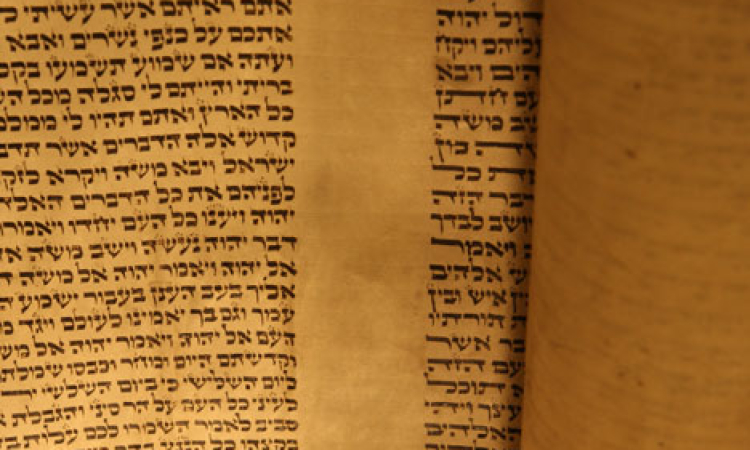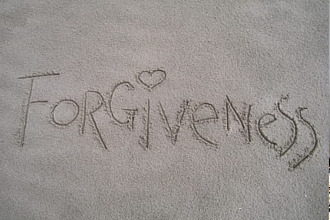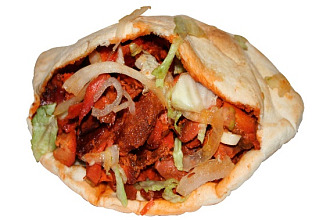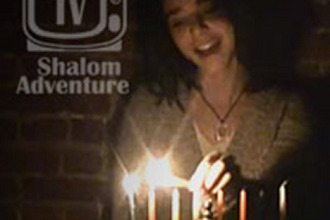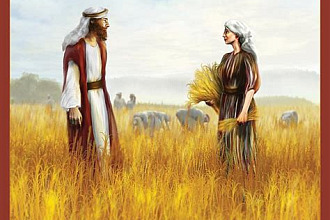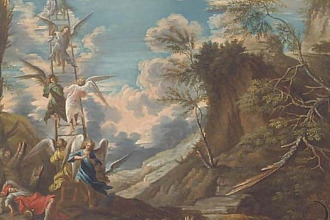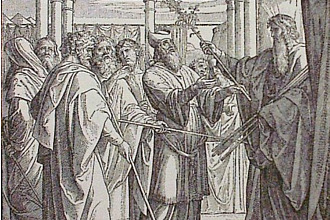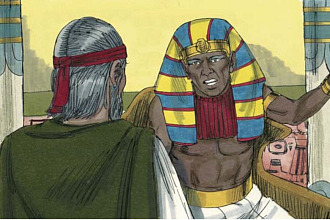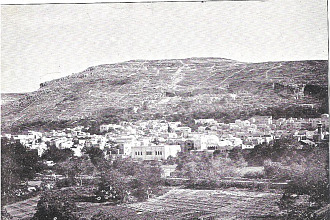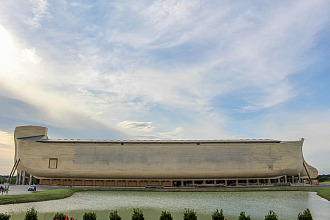Parasha for the Week: Re’eh Deuteronomy 11:26 – 16:17
Haftarah for the Week: Isaiah 54:11 – 55:5
Apostolic Writings: 1 Thessalonians 4:13 - 18
Overview:
Moshe presents to the nation the blessing of a spiritually oriented life, and the curse of becoming disconnected from Hashem.
When the nation enters Eretz Yisrael they must burn down any trees that had been used for idol-worship, and destroy all idolatrous statues.
Hashem will choose only one place where the Divine Presence will dwell. Offerings may be brought only there; not to a private altar.
Moshe repeatedly warns against eating animal blood. In the desert, all meat was slaughtered in the Mishkan, but in Eretz Yisrael meat may be shechted anywhere.
Moshe lists the categories of food that may only be eaten in Jerusalem.
He warns the nation against copying ways of the other nations.
Since the Torah is complete and perfect, nothing may be added or subtracted from it.
If a “prophet” tells the people to permanently abandon a Torah law or indulge in idol worship, he is to be put to death. One who entices others to worship idols is to be put to death. A city of idolatry must be razed.
It is prohibited to show excessive signs of mourning, such as marking the skin or making a bald spot.
Moshe reiterates the classifications of kosher and non-kosher food and the prohibi-tion of cooking meat and milk.
Produce of the second tithe must be eaten in Jerusalem, and if the amount is too large to carry, it may be exchanged for money with which food is bought in Jerusa-lem. In certain years this tithe is given to the poor.
Bnei Yisrael are instructed to always be open-hearted, and in the seventh year any loans must be discounted -- Hashem will bless the person in all ways.
A Jewish bondsman is released after six years, and must be sent away with generous provisions. If he refuses to leave, his ear is pierced with an awl at the door post and he remains a bondsman until the Jubilee year.
The Parasha ends with a description of the three pilgrimage festivals of Pesach, Sha-vuot and Succot
“Kosher Food”
Torah affirms, “However, you may slaughter and eat meat within any of your towns, as much as you desire, according to the blessing of the L-RD your G-d that he has given you. The unclean and the clean may eat of it, as of the gazelle and as of the deer.” (Deuteronomy 12:15). According to the Bible (Leviticus 11), the two signs of a kosher animals is that they chew their cud maalei geira and have split hooves mafris parsa. Kosher fish must have fins and scales. The Torah doesn’t give any signs for birds, but mentions which ones are the non-kosher. However, today animals are so sick that we should be very careful before eating them. Maybe it is time for us to come back to the ideal food, which were given by G-d to Adam and Eve in Eden: “G-d said, ‘See, I have given you every plant yielding seed that is upon the face of all the earth, and every tree with seed in its fruit; you shall have them for food.’” (Gen. 1:29) and after the sin G-d added all kind of herbs which are good for curing sickness “and you shall eat the plants of the field.” (Gen 3:18).
“Being Merciful”
The Torah states: “and He will give you mercy and be merciful to you” (Deuteronomy 13:18).The Talmud (Yevamos 79a) cites this verse to show that being merciful is one of the basic traits of the Jewish people. (The Almighty deals with us in the way that we deal with others. Therefore, if He is merciful with us, it is because we are merciful with others.) The essence of compassion is being able to imagine yourself in someone else’s situation. It is the resulting softness of the heart that makes one sensitive to the suffering of others — and allows one to strengthen his free-will to help others, though there might be a cost in personal welfare or comfort.
"Giving Tithes"
The Torah states: “At the end of every three years you shall bring out all the tithe of your produce in the same year and lay it up within your towns. And the Levite, because he has no portion or inheritance with you, and the sojourner, the fatherless, and the widow, who are within your towns, shall come and eat and be filled, that the L-RD your G-d may bless you in all the work of your hands that you do.”(Deuteronomy 14:28–29).
The Talmud teaches us, “Whoever gives charity to the poor is blessed with six blessings; and whoever speaks to him soothing words is blessed with eleven blessings. Thus, one who gives charity in a manner that comforts the poor person receives seventeen (9+6+2) blessings! This has the same numerical value as the Hebrew word, “Tov,” which means “good.”
Haftarah: Isaiah 54:11 – 55:5
This Shabbat is the third Shabbat after Tisha B’Av. We are in a period called Shiva D’nechemta—”Seven weeks of comfort.” The seven Haftarot of the weeks between Tish’a B’av and Rosh Hashana are prophesies of comfort and hope for Israel and G-d’s people at large.
The text of Isaiah continues to comfort Israel. It is not the time to make Israel feel guilty, but to build her up with the most precious stones. “O afflicted one, storm-tossed, and not comforted, I am about to set your stones in antimony, and lay your foundations with sapphires. I will make your pinnacles of rubies, your gates of jewels, and all your wall of precious stones “ (Is. 54:11-12). A wonderful promise is made when G-d says that he will teach the children of Israel himself. “All your children shall be taught by the L-rd, and great shall be the prosperity of your children” (13). This text reminds me of the promise made in Zechariah. “And I will pour out a spirit of compassion and supplication on the house of David and the inhabitants of Jerusalem, so that, when they look on the one whom they have pierced, they shall mourn for him, as one mourns for an only child, and weep bitterly over him, as one weeps over a firstborn” (Zech 12:10). G-d will pour out his Spirit on Israel and will teach them about the Messiah who has been pierced.
Israel has suffered. She has been persecuted by those who should be the first to show love. In order not to feel guilty, they say that all these sufferings came from G-d because of Israel’s rejection of the Messiah. But the L-rd said “If anyone stirs up strife, it is not from me; whoever stirs up strife with you shall fall because of you” (15). It is not from the L-rd. That is a great comfort for Israel. It is better to be on the side of G-d. That is why it is better not to curse Israel, and not to build any weapon against her. “No weapon that is fashioned against you shall prosper, and you shall refute every tongue that rises against you in judgment. This is the heritage of the servants of the L-rd and their vindication from me, says the L-rd” (17). The next chapter is a new call from the L-rd to Israel. “Incline your ear, and come to me; listen, so that you may live. I will make with you an everlasting covenant, my steadfast, sure love for David” (Is. 53:3). Paul confirms this with “as regards election they are beloved” (Rom 11:28).
Apostolic Writings: 1 Thessalonians 4:13 - 18
There is a commentary in the Jewish tradition which says that anyone who doesn’t believe that the Torah speaks about the resurrection, will not inherit eternal life. This statement has been made because many people think that the belief in the resurrection is a later doctrine, and was not affirmed by Moses in the Torah. Since Jews believe strongly in the resurrection at the coming of the Messiah. The Jewish people have some signs to recognize the Messiah when He will come: the gathering of Israel in their land, the building of the 3rd Temple, and the resurrection of the death. That is why as I have said in the commentary of the parasha, when Moses affirms in several places of the Torah that Israel is a “holy people” ‘Am Kadosh” (Deuteronomy 14:1-2), The Rambam (Maimonides) connects the fact that the people is holy, with living eternal life, through the resurrection. And the Jewish scholars have connected the resurrection to the Pentateuch by the fact that the reference to the G-d of Israel is many times a reference to the G-d of Abraham, Isaac and Jacob (Gen 26:24; 28:13; 31:42, 53; Ex 3:6, 15-16; 4:5; 1 Kings 18:36; 1 Chr 29:18; 2 Chr 30:6; Psa 47:9). Their reasoning is that G-d is a G-d of the living not of the dead, thus, if the Bible refers to G-d as the G-d of the patriarchs, it is, even though they are waiting for the resurrection, that they are considered as living people.
The belief in the resurrection has always been supported by the Bible. In fact, the Bible never speaks about the immortality of the soul. Even more, according to the Bible only one possess immortality: G-d. “our L-rd Yeshua Messiah, which he will display at the proper time—he who is the blessed and only Sovereign, the King of kings and L-rd of L-rds, who alone has immortality, who dwells in unapproachable light, whom no one has ever seen or can see. To him be honor and eternal dominion. Amen.” (1 Timothy 6:14-16). Immortality for human beings is conditional, it is given to us as a free gift only if we believe in G-d and His Messiah. “to those who by patience in well-doing seek for glory and honor and immortality, he will give eternal life;” (Romans 2:7). Rabbi Shaul explains that we cannot receive this eternal life without being changed from mortality to immortality: “Behold! I tell you a mystery. We shall not all sleep, but we shall all be changed, in a moment, in the twinkling of an eye, at the last trumpet. For the trumpet will sound, and the dead will be raised imperishable, and we shall be changed. For this perishable body must put on the imperishable, and this mortal body must put on immortality.” (1 Corinthians 15:51-53). It is a mystery, so that means something difficult to understand, only Yeshua came back from death, and did not explain what happened after death, he just said that he will give eternal life to those who believe in Him. And Rabbi Shaul compares death to “sleeping” which is the vocabulary and metaphor of the Bible about death, it is as if we were sleeping, exactly like after a very busy day, we feel so tired that going to sleep is sleeping so deeply that we don’t see the night passing, and we wake up immediately, suddenly we discover it is already morning. According to the Bible, dead people don’t feel anything during this time of death or “sleeping” in a sparkling of an eye, they are immediately transported to the time of the coming of the Messiah, and they discover that they are among the saved people.
In another text Rabbi Shaul speaks about this topic, in his letter to the Thessalonians, in fact, he was receiving a messenger from that church, who was asking him the following question: “We were promised that Yeshua would come back very soon to introduce us to the kingdom of G-d, and we see our parents, and fellow believers dying and Yeshua is still not here, What will happen to them?” Rabbi Shaul answers: “But we do not want you to be unin-formed, brothers, about those who are asleep, that you may not grieve as oth-ers do who have no hope.” (1 Thessalonians 4:13) here is the great difference between those who believe and those who don’t believe, we have this hope in the afterlife. And he continues to explain “For since we believe that Yeshua died and rose again, even so, through Yeshua, G-d will bring with him those who have fallen asleep.” (14). This text is very clear, the resurrection exists, Yeshua will bring to life those who have fallen asleep. He says how: “For this we declare to you by a word from the L-rd, that we who are alive, who are left until the coming of the L-rd, will not precede those who have fallen asleep.” (15) G-d wants us to arrive into the kingdom of G-d at the same time. Those who precede us, and who have fallen asleep, are not yet in heaven, they are waiting for us, and we will not arrive in afterlife before those who have already lived on the earth since the time of Adam till today, we will all meet the L-rd at the same time. Here is how: “For ‘the L-rd himself will descend from heaven with a cry of command, with the voice of an archangel, and with the sound of the trumpet of G-d. And the dead in Messiah will rise first. Then we who are alive, who are left, will be caught up together with them in the clouds to meet the L-rd in the air, and so we will always be with the L-rd.” (16-17). There is no mention of a secret rapture, but a visible rapture, so visible that we will see the dead resurrecting and going to meet the L-rd in the air, not on this earth, it will be a terrible time of earthquake and catastrophes. The saved people who will resurrect and those who are alive will be changed from mortals to immortals, that these catastrophes around them will not have any effect on them, they will be happy to go to meet the L-rd (Yeshua) in the air. That is why the last words of Rabbi Shaul in this chapter are “Therefore encourage one another with these words.” (1 Thessalonians 4:18). Let us be part of this wonderful free gift of the resurrection.

